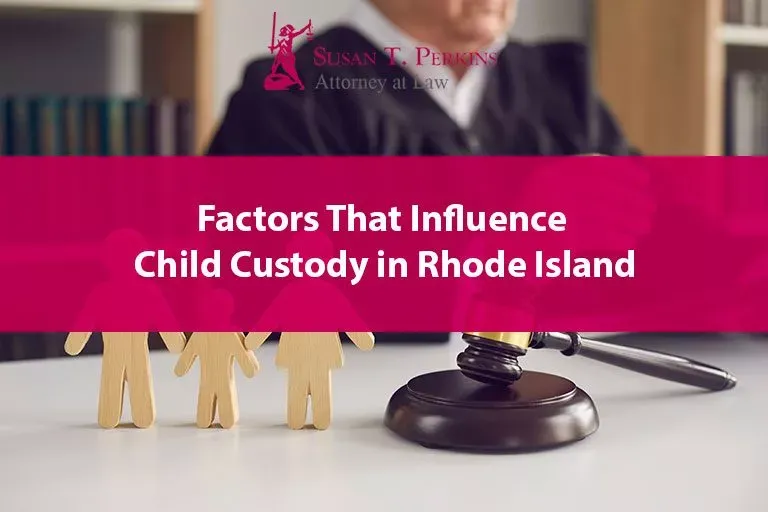
As you prepare for your divorce, you have a lot on your plate. It’s easy to get overwhelmed with all the details and moving parts.
But through it all, you have to keep your relationship with your children front of mind. Taking the proper steps during this process can help your kids bounce back without long-term impacts to their mental health.
As a knowledgeable and skilled Rhode Island divorce attorney, Susan T. Perkins has spent over 2 decades helping people like you ensure custody agreements offer the best possible outcome for you and your children.
In this guide, you’ll learn about the factors that influence child custody in Rhode Island, get answers to custody FAQs, and learn what your next steps should be.
Here Are Factors That Can Influence Child Custody Decisions in Rhode Island
- Having a criminal record. If you’ve committed a crime in the past, the judge has to consider this during custody proceedings. But charges/convictions related to violent behavior or substance abuse, for example, can be grounds for denial of visitation or custody.
- The way you and your spouse fought during the marriage and divorce proceedings thus far. The judge will evaluate how you and your spouse have communicated while raising your child. Even “minor” things like angry remarks about your spouse in front of your kids can negatively impact your custody requests.
- Struggling with your living situation. Since the children’s well-being is the most important factor in Rhode Island custody proceedings, you need to show you have a nurturing, safe home. Your living situation and location of your home will both be evaluated.
- Working long hours. Sometimes, providing for your child financially takes long working hours. But you still have to be around to support their developmental and psychological needs. Also, if you’re often on-call or travel for work, this can impact whether you get primary custody.
- Quitting your job. Again, you have to provide financially for your children. If you’re unemployed, the judge will have a hard time seeing how you’ll be able to meet this requirement.
- Dating someone new. The judge knows this new person will come into your child’s life sooner or later. So, the court may request information related to your new partner and their children (if they have any). The same is true of anyone living with you, even roommates.
- History of smoking in the home or around your kids. In past custody cases, parents who smoke around their children or in the home have faced a loss of custody and/or visitation rights. If you’re a smoker, it’s crucial to set boundaries that protect your children—or try to quit altogether.
- Other actions prior to the divorce. Because the “best interests of the child” are somewhat subjective, there are many other factors a judge may consider. Every divorce is unique, and the court will consider any actions they feel are relevant to making a fair custody decision.
You should also know certain things can’t influence child custody decisions in Rhode Island. For example, each parent’s gender has no impact on custody. In RI, mothers also aren’t granted an automatic advantage in child custody.
What is the “Best Interests of the Child” Standard in Rhode Island?
The “best interests of the child” standard in Rhode Island means that if you and your spouse can’t reach a legal custody agreement amicably, the RI family court will determine custody based on what will best serve your kids.
The thing is, there’s no cut-and-dry formula on how to make this determination.
It’s not as simple as you and your spouse filling out a court-issued questionnaire. Every judge has their own process for gleaning the necessary information and making the final decision.
How Does the Court Determine the Best Interests of the Child in Custody Cases?
Though every judge has their own methods for learning about what might work best for your child, there are specific factors they must consider:
- Your ability and willingness to allow your children to have a good relationship with your soon-to-be-ex, and vice versa
- The moral fitness of both parents
- How stable the child’s home environment is and will be
- The physical and mental health of both parents and the child
- How the child will adjust to a new school, community, and home
- The existing interactions and relationships between the child, any siblings, both parents, and any other significant parties
- The child’s preference, assuming their preference is reasonable based on their experiences and maturity
- Any history of domestic violence, abuse, or neglect with either parent
- The wishes of you and your soon-to-be-ex regarding custody
- The child’s relationship with you and with their other parent
- The child’s age, healthcare needs, emotional needs, and any other aspects in which they need specific support
What is the Age at Which a Child can Express Their Custody Preference in Rhode Island?
Any child can express their custody preference in a Rhode Island divorce case. But remember, expressing a preference and having the power to decide are very different things.
As you now know, Rhode Island courts consider the best interests of the child when making custody decisions. If your child is sufficiently mature and they can explain the reasons for their preference, they’ll be allowed to express these opinions.
Can a Child’s Preference for Custody Be Overruled By the Court?
Yes, the court can absolutely overrule a child’s preference for custody in Rhode Island divorce cases. When a child’s wishes don’t align with their best interests, the judge has the authority to make that call.
There are several scenarios in which this might occur. If the child’s preferred parent has any kind of substance abuse issues or has demonstrated they’re unfit to care for the child, they won’t get custody. It’s also common for children to express a “preference” when they’re really rebelling against structure and rules as a whole.
These are a few examples, but far from the only scenarios in which a child’s preference might be overruled. And there’s always a chance the court will consider joint custody, depending on the details of your situation.
A Rhode Island Divorce Attorney Can Help Safeguard Your Connection to Your Children
It’s true that getting divorced won’t make you love your kids any less. But loving your kids isn’t enough on its own to guarantee you get the fairest resolution in terms of custody.
When you work with Susan T. Perkins as your Rhode Island divorce attorney, you benefit from her 20+ years of successful experience handling hundreds of family law cases. She and our legal team will take every step to ensure your rights are honored and you’re treated fairly.
If you’re ready to learn more about how we can help, just call us today at 401-PERKINS for your free consultation.




